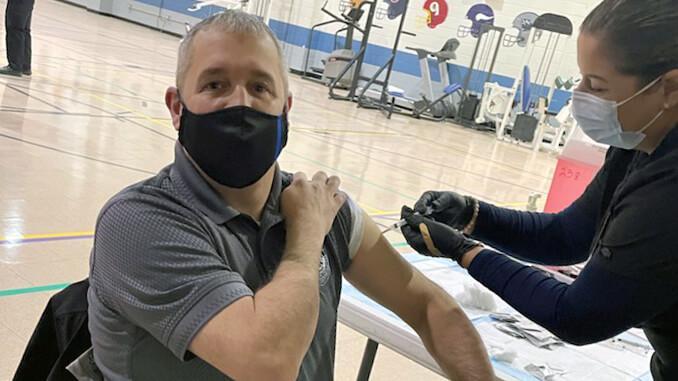NEW BRITAIN, Conn. – Sean Howard, a State of Connecticut correction officer and president of AFSCME Local 387, (Council 4) contracted COVID-19 last year. He now has a heart condition and is on several medications.
“I still deal with fatigue and shortness of breath,” said Howard, who works at the Cheshire Correctional Institution. “My cardiologist said this is something I will always deal with, and that my life may never be the same.”
Frustrated by the Department of Correction’s (DOC) inability to release a vaccination plan, Howard and several of his fellow AFSCME front-liners shared their stories at a press conference sponsored by Connecticut Council 4. Immediately after the Jan. 28 briefing, the DOC announced it would begin vaccinating employees in early February.
The announcement was welcome news for the 4,000-person AFSCME NP-4 Correction Bargaining Unit, and re-affirmed the value of unions. By taking action through their union, these front-line COs were able to protect themselves, their families and the inmates in their care.
“Our agency has failed to adequately protect its brave and dedicated staff since the beginning of the pandemic,” said AFSCME Local 391 President Collin Provost. “Thankfully, our three unions and Council 4 continue to demand accountability. That’s what we mean by having a voice on the job.”
Since the start of the pandemic in March, Connecticut’s corrections locals have advocated for a strong and proactive response to limit the spread of the coronavirus within state prisons. The locals even procured 10,000 N-95 masks when their agency did not have enough on hand.
“Whether it’s providing proper (personal protective equipment) and testing, or trying to safely manage the movement of staff and inmates, our unions have been the ones speaking out and demanding better,” said AFSCME Local 1565 President Michael Vargo.
Industries Supervisor Aimmee Reyes-Greaves, AFSCME Local 391
COVID-19 has been difficult to tame within the state prison system. As of Jan. 28, more than 3,000 inmates and 1,000 correctional staffers who formed unions through AFSCME have tested positive. At least 19 inmates have died from the virus, bringing additional scrutiny on the DOC’s handling of the crisis.
Correction Officer Ginny Ligi of Local 387 and Industries Supervisor Aimmee Reyes-Greaves of Local 391 are among the many who were infected by the virus. They have husbands and young children at home.
Ligi was bedridden for three weeks last April before returning to Cheshire Correctional.
“I am still struggling to feel normal,” she said. “I have chronic fatigue, and constant headaches, which doctors have told me are from the virus. My taste and smell have yet to return to 100% normalcy.”
Reyes-Greaves, who works out of Osborne Correctional in Somers, came down with COVID-19 after Christmas.
“It was the scariest thing ever. The first thoughts in my head were ‘Oh my God, my husband and my son are going to be sick.’ It was frightening,” she recalled.
Working in the correctional system is already one of the toughest jobs around. COVID-19 has multiplied the dangers of their environment.
“Going back to work, I saw my fellow co-workers dropping like flies,” Ligi said. “Some of them ended up in the (intensive care unit). Being so short-staffed, we are constantly mandated to work additional shifts. The lack of sleep and long hours are probably a huge factor as to why so many of us never fully recovered.”
Still, AFSCME members remain resolute in their commitment to maintaining public safety while advocating for their own health and well-being.
“Our daily lives include the constant risk and exposure to this virus,” Reyes-Greaves pointed out. “We are determined in doing our job and we should be protected while doing so.”

